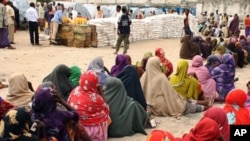Somalis – and especially young Somalis – in Minnesota’s diaspora communities are collaborating in creative ways to raise money for the displaced and hungry.
They are among the many diaspora communities in the U.S. responding to the crisis. Many have extended family in Somalia suffering from the drought, and these young Somali-Americans say they can – and should – help.
Shukri Abdinur, who was born in Somalia, is a 23-year-old graduate of the University of Minnesota. She joined the relief effort as a volunteer for the American Refugee Committee, or ARC, organizing fundraisers to benefit the victims in East Africa. For her, the famine is a reminder of how fortunate she and other Somalis in the U.S. are, and why they must help.
“At the end of the day,” she said, “I’m Somali, those are my brothers and sisters. It is extremely important that we don’t forget that those people back home are suffering and I could have easily been one of those people because I was one of the lucky ones to leave during the war.”
Like Shukri, many Somali youth in Minneapolis are thinking of ways of contributing to -- or partnering with – agencies like the ARC which can effectively distribute aid.
The group’s president, Daniel Wordsworth, said it has been working for some time with Somalis in the diaspora to set up a fundraising network.
“We’ve spent a year and a half building up relationships throughout the Somali community. That’s what Neighbors for Nations is. It’s the name for the partnership between us and the Somali community starting here in the Twin cities [Minneapolis and St. Paul]," he said. "We already had all of these relationships before the famine struck. It all comes together when there is a crisis like this.”
According to Wordsworth, the first thing that needs to be done is recognizing that it is actually the Somali community in the U.S. and the global diaspora who are the keys to making a difference in their country.
“What we are trying to do,” he said, “is support them and their efforts to make a difference there.”
In return for raising funds, the ARC will help volunteers go to Somalia to work directly with relief efforts.
“A lot of what you see us doing is helping to mobilize their community, helping to allow them if they want to send their funds, that they can send their funds through. If they would like to volunteer as a doctor or as an engineer, we can provide a vehicle for them to get over and make a difference in their country,” Wordsworth said.
With the drought crisis underway, the ARC is already putting donations to good use. Wordsworth said that the ARC has a team on the ground in the capital, Mogadishu, distributing food, as well as tarpaulins, blankets and cooking utensils to families.
Most of the supplies distributed by the ARC are funded by the American Somali communities. The Minnesota diaspora alone has raised more than $100,000 in the last two weeks.
In Minneapolis, local Somalis continue their fundraising efforts by hosting carwashes, picnics, and sports events. Shukri said she helps organize the car washes and hold picnics where people were charged $5 a plate. According to Shukri at events like this the whole community almost 200 people were present.
“We also are doing a one day basketball tournament this weekend, where we are going to have about six to eight teams who are also paying to play and then we have admissions and so we’re going to basically profit off that and then give that to the ARC,” Shukri said.
The fundraisers wouldn’t be nearly as successful if it weren’t for the help of social media like Facebook to spread the word about on-going events.
The new and free alternative to formal fundraising is successfully drawing in a younger crowd of volunteers.The new generation is tech-savvy, politically-aware, and inspired to help out.
Videos and slide shows on You Tube and other sites are making the grim reality of the famine widely accessible to a wider and younger audience.




